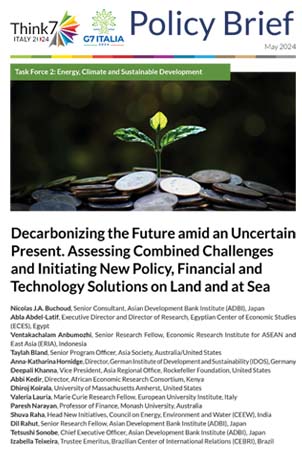Abstract:
It took more than a decade for developed countries to start fulfilling the 100 billion US dollars climate finance pledge from the Copenhagen COP15 and tensed discussions prevailed for the creation of the loss and damage fund acknowledged at the COP28. Hence, global commitments remain far from matching the actual needs of developing countries, both in terms of quantity and quality.
In 2023, think-tanks from the G7 (T7) and G20 (T20) underlined that addressing the climate crisis is inseparable from enabling just energy transitions and from addressing the debt crisis in the Global South. Additionally, climate adaptation scenarios have been overlooked in favour of climate mitigation pathways, largely reflecting developed nations priorities.
Whereas converging evidence show that the 1,5° limit set up by the Paris Agreement could not be achieved by 2030 and global warming tends to accelerate, energy security has swiftly taken the centre stage of climate talks. Fossil fuel subsidies have reached historically high levels, including in G7 countries, while geopolitical uncertainties affect the allocation of ODA. This questions the feasibility of recent pledges by the G7 – and other major countries, whereas vulnerable countries such as small island states are exposed to rapidly mounting risks.
Climate finance, quoted by UNFCC as the “great enabler of climate action” at the COP28 is acknowledged as a priority for the climate talks ahead of the Baku COP29. However, accessing to climate finance – public, private, blended – remains challenging for many lower- and middle-income countries, in a context of fragmented geopolitics which weakens existing multilateral institutions.
Unlocking climate finance, especially in the countries that are on the forefront of climate risks, is a priority of common interest for all. Therefore, the present policy brief explores some climate actions which the G7 could rapidly spearhead to restore a multilateral capacity to act – including financially – for and with the most vulnerable. It also calls for an enduring cooperation among think-tanks within the G7 and G20, and beyond.
The present policy brief is complemented by two special focus, exploring the impacts of climate disclosure to support the unlocking of climate finance and proposing an innovative roadmap for sustainable ocean financing.

Decarbonizing the Future amid an Uncertain Present. Assessing Combined Challenges and Initiating New Policy, Financial and Technology Solutions on Land and at Sea
01-07-2024
Author(s): Dr. Abla Abdel-Latif, Executive Director and Director of Research, ECES
Publication Number: ECES-PIO6-E
